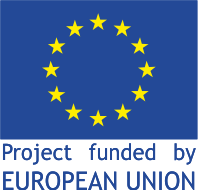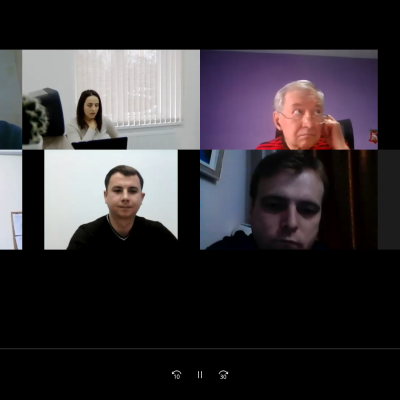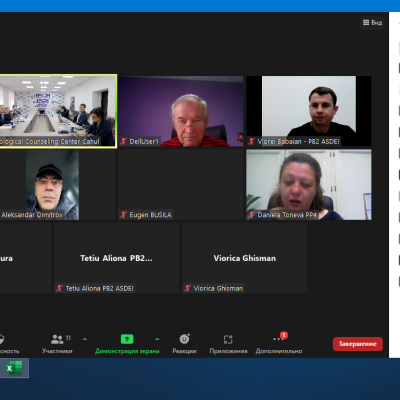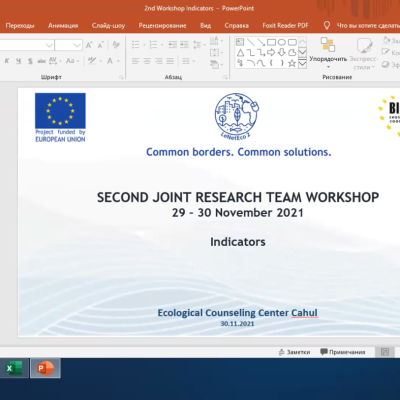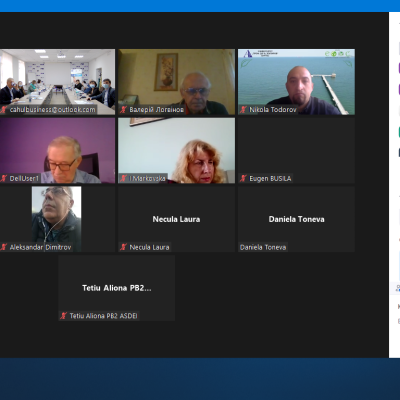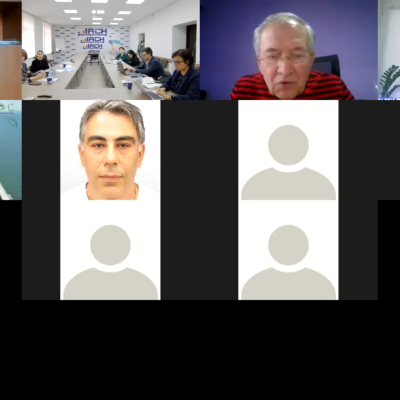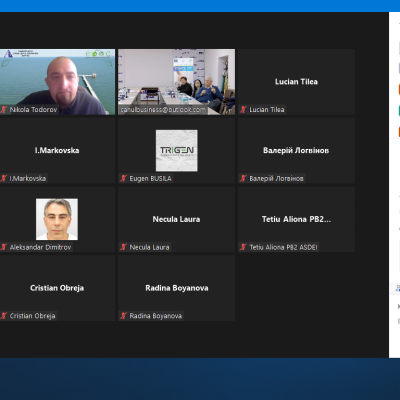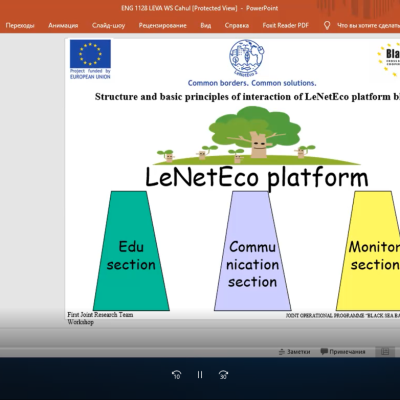
Second Joint Research Team Workshop Group of Activity: T3 Joint Environmental Research 29th-30th November, 2021 Conference Hall of the Business Incubator, Cahul, Republic of Moldova
The Second Workshop of the Joint Research Team within project “Establishment of Learning Network for the consolidation effort of joint environmental control and monitoring in the Black Sea Basin 2” LeNetEco 2, Project Number: BSB-1088 in the framework of JOP “Black Sea Basin 2014-2020” was organized during the 29th-30th November 2021 period, in Cahul (Republic of Moldova), in a hybrid way (face-to-face and online via ZOOM). The workshop agenda was distributed for 2 working days.
The first day of the Workshop started on November the 29th, in the Conference Hall of the Business Incubator Cahul, str. Bogdan Petriceicu Hașdeu, nr.2, Cahul, Republic of Moldova. At the Workshop participated 21 persons, of which: 12 experts, members of the Joint Research Team, 8 members of the project management group, 1 translator.
Mr. Lucian Țilea, Project Manager of the Lead Beneficiary – Galați Danubius University, welcomed the participants and emphasized the importance of this workshop for achieving and solving the project delays.
Mr. Artur Nebunu, project coordinator of the Project Beneficiary PB6 - Ecological Counseling Center Cahul, welcomed the participants and accentuated the importance of the workshop in achieving the project objectives.
The objectives of the Second JRT Workshop were focused on establishing the structure of internet Platform “LeNetEco”, presentation of Environmental education Programs/Courses in the partner countries, and Development of good practices review.
LeNetEco2 education web-page structure
Mr. Valerii Lebid, specialist of profile organizations-laboratories from PB2 - Agency of Sustainable Development and European Integration "Lower Danube" Euroregion, Ukraine presented the structure of the LeNetEco2 education web-page. The basic principles of interaction of the LeNetEco platform blocks there were presented: educational section, communication section and monitor section.
There were presented the functions of the educational section (webpage): by whom it will be administrated; use of the distance learning systems; management of the participants and registration; training courses management; interaction tools for the participants. Besides the functions of education section, the functions for communication and monitoring sections, the content of the management system and the description of the input data for the platform and user interface requirements, there were presented, as well.
E-Map of Environmental Monitoring Structure.
Mrs. Vasiutynska Ekateryna, expert in monitoring methodology, PB2 - Agency of Sustainable Development and European Integration "Lower Danube" Euroregion, Ukraine, presented the interactive user interface: how and in which manner the volunteers will introduce the data regarding different types of pollution; functions for monitoring section; functions for the analysis block; database; requirements for the data that will be reflected on the E-map; requirements to the online E-map; spam avoiding, etc.
The discussions on the types of indicators for environmental monitoring that will be uploaded by volunteers in the E-map, established that the indicators should be simple, visible, palpable, easy to observe and monitor for a simple person without in-depth experience in the field. The indicators uploaded by volunteers will be public indicators that can be checked.
Status JRT. E-map indicators
Mrs. Natalia Budescu, PB5 - Association of Cross Border Cooperation “Lower Danube Euroregion”, Romania, added an input to the E-map section, mainly on indicators for environmental monitoring that will be uploaded by experts in monitoring methodology from each partner. These will be professional indicators provided by experts with the experience in the area. For E-map it was proposed to have several layers for completing and uploading the information on indicators, separate layer for volunteers and layers for experts for more complex indicators. The partner presented the indicators for monitoring the water quality that they proposed to be used for E-map section. As each partner should propose the indicators, in case of two partners from one country the indicators should complement each over.
Web-page structure of the “Volunteer of environmental monitoring"
Mrs. Maria Cristenco, PB6 Ecological Counseling Center Cahul, Republic of Moldova presented the Concept and the components of the E-service webpage "Volunteer of environmental monitoring", and how it will be administrated. On the main page – containing 6 categories/sections, the information will be uploaded by all partners in English language. In regional offices – secondary pages with categories, information will be in national languages.
As a comment from partners at the level of partners there is a need to attract new volunteers from different perspectives – one of them a better communication about the project and its components (using Facebook or other instruments to redirect potential volunteers to LeNetEco Platform).
Draft of the Eco-Office Provisions of the "Volunteer of environmental monitoring"
Mrs. Maria Cristenco, PB6 - Ecological Counseling Center Cahul presented the draft of the Eco-Office Provisions of the "Volunteer of environmental monitoring". There were discussed several subjects related with: volunteer office structure and management, directions of activity, responsibilities of volunteers, who can become members of regional offices, purpose and tasks of volunteering, etc.
The Good practices review structure.
Nikola Todorov, specialist of profile organizations-laboratories, PB4 - University “Prof. D-r Assen Zlatarov”, Bulgaria made the presentation on Good practices review structure and described the proposed chapters of the review: introduction (about the project and the role of good practices); good practices in training; application of good practices in the area; identified good practices for environmental education in EU universities; reference part. The expert presented the main principles and criteria for identification the good practices in educational process no mater of target group, and all courses can be adapted to these principles.
The second day of the Workshop started on November the 30th of November and started with the continuation the discussions on indicators for environmental monitoring received from experts of the partners PB2, PB4, PB5 and PB6. Each expert and partner exposed their opinion regarding the reason of selecting the specific indicators. The indicators from partners will be sent to partner PB3 - Odessa State Polytechnic University, which is responsible for development of the e-Map of Environmental Monitoring. were focused on the structure of the educational program. The Workshop continued with the discussions on the educational program to be developed as the main support for the LeNetEco Platform.
Structure of the educational program, Romania.
Cristian Dragoş Obreja, Specialist of profile organizations laboratories, LB - Danubius University Galati, presented the structure of the educational program in Romania including the basics for 3 Pilot Groups. The expert presented the table of contents of the educational program structure with the chapters, the target groups, objectives of the course, detailed description of six chapters, form of assessment the satisfaction of trainings, etc.
Structure of the educational program, Bulgaria.
Daniela Toneva, Expert in curriculum development of PB4 - University “Prof. D-r Assen Zlatarov”, Bulgaria described the basics of the educational program: structure of common educational program at project level, agreed with all curricula experts; structure of common educational program at partner level; curriculum for Pilot Group 1 - pupils with specific goals, aims, topics; curriculum for Pilot Group 2 students with specific goals, aims, topics; curriculum for Pilot Group 3 - local authorities with specific goals, aims, topics; a common form for assessing the satisfaction.
The expert proposed that in the LeNetEco Platform to be uploaded the common conceptual program as a framework and all training programs developed by partners; as well, all class materials for each Pilot Group from each partner. Each partner should have common goals and objectives for each Pilot Group, as well partners courses should have specific aims for each country.
The curricula expert from Bulgaria proposed the plan for the work to be done regarding trainings and work of curricula experts. The expert proposed the deadlines for common tasks and activities, with which all experts and project partners agree.
Structure of the educational program, Odessa, Ukraine.
Valerii Logvinov, Expert in curriculum development PB3 - Odessa State Polytechnic University, Ukraine, presented the structure of the educational program, Ukraine including a draft approach to the formation of the common training program for target groups, as objectives, tasks and time of the training program will be common for all partners and content of the programs will be different. The expert explained the tests envisaged for training program – the number of questions 20 - 40 for the program, the subject will be discussed within the Skype curricula group. The expert explained the structure of the Common training program and the structure of the Training programs for project partners as a scheme of displaying on the educational webpage.
As well the expert gave as an example the training content for Pilot group 3 – Regional and Local Authorities, as objectives, tasks, curriculum with topics and themes.
The expert emphasized a vision about keeping the training programs and educational webpage as the main part of the LeNetEco Platform, presenting the vision on LeNetEco Project Architecture and the opinion about the interaction between expert groups and between web pages of the LeNetEco Platform, as well.
The expert presented a draft for the Educational webpage structure with detailed information on the content of the webpage.
The period of May-June of 2022 was proposed for the implementation of the training courses.
Structure of the educational program, Republic of Moldova.
Liliana Ceclu, on behalf of the expert in curriculum development PB6 - Ecological Counseling Center Cahul, Republic of Moldova, presented the Structure of the educational program for Republic of Moldova. At the moment the expert has developed the training course for the pupils. The expert presented the basics for 3 Pilot Groups – PG1, PG2 and PG3.
The course for Pilot Group 1 was completed with the topics relevant to the Republic of Moldova, having the base the presentation of the Bulgaria curricula expert, the presentation that was agreed within the curricula experts Skype group. The course contains a description of the aquatic resources from the Republic of Moldova, with an accent on Dniester and Prut rivers, Danube delta. As well the course contains information regarding Black Sea basin. Another specific topic covered by the course is the pollution of aquatic resource of the Republic of Moldova. Politics and public sources of environmental information of the aquatic resources of the Republic of Moldova and of the Black Sea region will be another subject covered by the course.
The expert mentioned that totally agree with the curricula draft for partner countries developed by Mrs. Daniela Toneva, Bulgarian curricula expert.
|
DECISIONS TAKEN |
- For E-map it is proposed to have two categories of indicators to be uploaded on the web page: the indicators uploaded by volunteers and the professional indicators that will be uploaded by partners and their experts.
- Partners should finalize the list of the selected indicators for their country and the completed list of indicators will be sent to PB3 Odessa State Polytechnic University, partner responsible for the development of e-Map of Environmental Monitoring.
- PB3 - Odessa State Polytechnic University will give a final feedback on indicators proposed for e-Map of Environmental Monitoring, by December 10th.
- The responsibility for completing the e-map with professional monitoring indicators falls on the project partners, both during the project implementation period and after the completion of the project.
- Regarding the structure of E-service and Draft of the Eco-Office Provisions, the partners and experts will give the feedback and proposals regarding the simplification of this regulation until December the 3rd.
- Online workshops to be organized to justify the final version of the education webpage structure to LeNetEco platform (1), and to justify the final version of the e-service "Volunteer of environmental monitoring" webpage (2).
- Curriculum experts will add in training courses subjects for each pilot groups, were will be covered all three sections of the LeNetEco platform (educational webpage, e-map section, e-volunteer page) to ensure a greater contribution of volunteers in the involvement and administration of relevant sections of the platform, and to make the platform known to the general public.
- The review of good practices should be considered and implemented in the trainings.
- Define the main goals for curricula courses for Pilot Group 4 and Pilot Group 5 at project level by the end of December 2021.
- Approval of the Common conceptual program by Joint Research Team and Project Management Group, by the end of January 2022.
- Developing curricula programs for Pilot Group 4 and Pilot Group 5 by the end of February 2022.
- Approval of curricula programs for Pilot Group 1 - Pilot Group 5 by Joint Research Team and Project Management Group by the end of February 2022.
- Preparation of course materials for Pilot Group 1 - Pilot Group 5 by partners – March 2022.
- Implementation of the training program by the end of May 2022.
- Development of check lists for curricula experts for the work progress.
